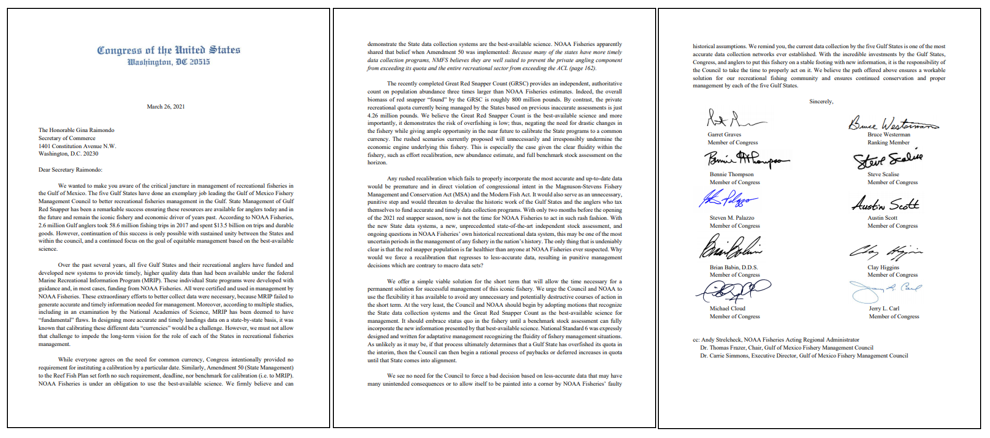Press Releases
Hands off the Reel, Secretary of Commerce! Graves Leads Effort to Preserve State Management of Fisheries
Washington, DC,
March 26, 2021
U.S. Congressman Garret Graves (South Louisiana) penned a letter to Secretary of Commerce Gina Raimondo to make her aware of the federal government's inability to be efficient and ability to be behind the ball on state management of recreational fisheries in the Gulf of Mexico. The letter raises the point that because of the Magnuson-Stevens Fishery Management and Conservation Act (MSA) and the Modern Fish Act, there should be accurate data collection used for recalibration – especially with only two months before the opening of the 2021 red snapper season. But if there is a rushed recalibration that does not use the most accurate and up-to-date data, this would make the case the current data collection by the five Gulf States is one of the most accurate data collection networks ever established. Just earlier this week, it was announced the red snapper populations in U.S. coastal waters are 110 million red snapper – roughly three times more than previously estimated (approximately 36 million) – according to the Gulf of Mexico Great Red Snapper Count. The report estimated that there are 29 million adult red snapper off the Louisiana coast, 48 million off Florida, 23 million off Texas, and 10 million off Mississippi and Alabama. Key excerpts in the letter: "Over the past several years, all five Gulf States and their recreational anglers have funded and developed new systems to provide timely, higher quality data than had been available under the federal Marine Recreational Information Program (MRIP). These individual State programs were developed with guidance and, in most cases, funding from NOAA Fisheries. All were certified and used in management by NOAA Fisheries. These extraordinary efforts to better collect data were necessary, because MRIP failed to generate accurate and timely information needed for management. Moreover, according to multiple studies, including in an examination by the National Academies of Science, MRIP has been deemed to have "fundamental" flaws." "We believe the Great Red Snapper Count is the best-available science and more importantly, it demonstrates the risk of overfishing is low; thus, negating the need for drastic changes in the fishery while giving ample opportunity in the near future to calibrate the State programs to a common currency. The rushed scenarios currently proposed will unnecessarily and irresponsibly undermine the economic engine underlying this fishery. This is especially the case given the clear fluidity within the fishery, such as effort recalibration, new abundance estimate, and full benchmark stock assessment on the horizon." "Any rushed recalibration which fails to properly incorporate the most accurate and up-to-date data would be premature and in direct violation of congressional intent in the Magnuson-Stevens Fishery Management and Conservation Act (MSA) and the Modern Fish Act. It would also serve as an unnecessary, punitive step and would threaten to devalue the historic work of the Gulf States and the anglers who tax themselves to fund accurate and timely data collection programs. With only two months before the opening of the 2021 red snapper season, now is not the time for NOAA Fisheries to act in such rash fashion." "The only thing that is undeniably clear is that the red snapper population is far healthier than anyone at NOAA Fisheries ever suspected. Why would we force a recalibration that regresses to less-accurate data, resulting in punitive management decisions which are contrary to macro data sets?" "We urge the Council and NOAA to use the flexibility it has available to avoid any unnecessary and potentially destructive courses of action in the short term. At the very least, the Council and NOAA should begin by adopting motions that recognize the State data collection systems and the Great Red Snapper Count as the best-available science for management." Graves was joined by several members Gulf State members supporting this effort:
|




